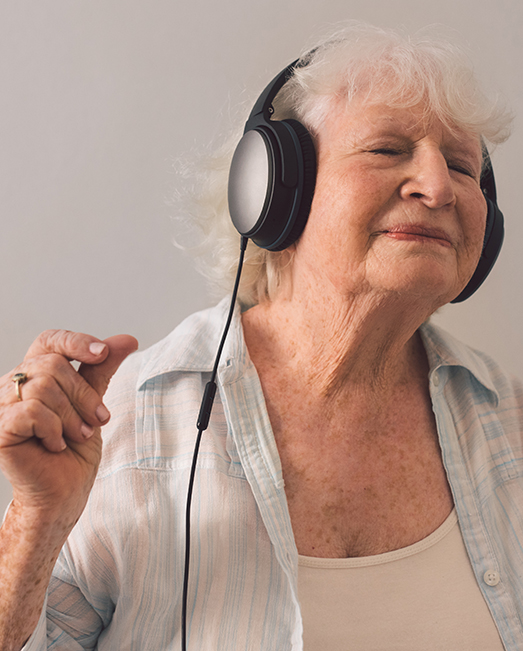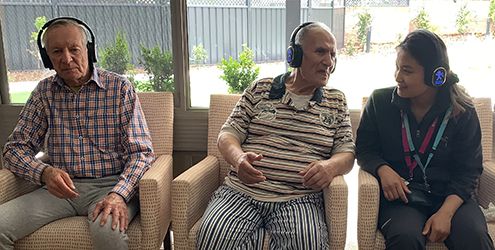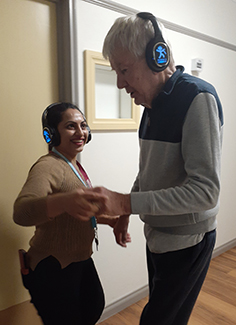Community
Copyright@ Australian Catholic University 1998-2026 | ABN 15 050 192 660 CRICOS registered provider: 00004G | PRV12008
Copyright@ Australian Catholic University 1998-2026 | ABN 15 050 192 660 CRICOS registered provider: 00004G | PRV12008

An elderly man named Henry sits in a chair in a nursing home with his arms folded. He is inert and unresponsive, his eyes half-shut and not focused on anything in particular. He’s given a pair of headphones and played his favourite music, the flamboyant scat jazz of Cab Calloway. Suddenly, Henry is transformed into a lucid and lively character, singing and scatting along with the music and responding to questions with alertness and wit.
This reaction, captured in an inspirational documentary on music and memory, is typical of the responses that ACU psychology researcher Kirsten Challinor has witnessed in person at Australian aged care homes.
“The first round of research we did, we ran programs for aged care residents and their loved ones where we’d put on music, a lot of Elvis Presley or Neil Diamond and that kind of thing,” says Dr Challinor, whose research in partnership with social enterprise Moove and Groove explores the impact of music on seniors.
“Before the class, you’d see people living with dementia in quite vague conversations, quite downcast and not very responsive, and then they’d join the music class and suddenly start dancing around and becoming extremely excited and joyful and vibrant during the class.”
The most amazing thing, she says, is what happens directly after a music therapy session.
“You watch them sit down and chat with their loved ones and have deep conversations about really important things, and the wives and husbands of these people will often say, ‘Honestly, I’ve not had a conversation like this with my partner for a very long time’. It’s almost like they’re reconnecting with the real person.”
Dr Challinor leads a team of academics investigating how Moove and Groove’s silent disco technology can enhance quality of life and reduce depression for those living in aged care.
They’ve worked across 64 Uniting Care centres in NSW and Canberra and found the program has a positive impact on dementia-related behaviours like agitation, pacing and apathy.

Moove and Groove uses wireless headphones connected to an app to give aged care residents access to a range of immersive activities, including bespoke music playlists, podcasts and videos, and other content like games, exercise classes and streamed religious services.
The program often has an instant effect in boosting the mood and temperament of people with cognitive impairment.
“There’s not a single class that I’ve attended where I didn’t cry, because it’s so beautiful to see that transformation,” says Dr Challinor, a researcher and lecturer in psychology at ACU’s School of Behavioural and Health Sciences.
“As a researcher and also as a person, it’s very hard not to walk away feeling really fulfilled and quite fortunate to have witnessed that.”
In recent years, researchers investigating aspects of dementia have discovered that musical memory remains intact even when memories of places, words and people have faded.
This means music can be an effective tool to stimulate those with Alzheimer’s disease and other forms of dementia, enabling them to reconnect with old memories and revive emotions and images.
Despite repeated studies showing that music is an effective intervention, the question of why it affects the brain in this way is still poorly understood.
“Right now, there’s not a lot known about exactly what’s happening in the brain when a person with dementia listens to music,” says Dr Challinor, whose collaboration with Moove and Groove recently secured another $10,000 in funding from the NSW Government.
“What we do know is that we somehow keep memories of music even when we lose words and language, and so listening to music — especially music that’s familiar to you — it can trigger and stimulate the key brain areas linked to musical memory, and that somehow lights up the rest of the brain at the same time.”
One of the most encouraging signs of the ACU/Moove and Groove collaboration is the potential that music therapy could reduce the use of anti-psychotic medication in aged care facilities.
People living with dementia often become agitated during certain times of day. This phenomenon, known as “sundowning”, can result in the person becoming restless, upset, suspicious and disoriented.
“We find that in the afternoon, you see a lot of behaviours in the residents that the aged care staff see as very concerning,” Dr Challinor says. “The resident might become unsettled, confused and agitated, and sometimes that escalates to anger and aggression.”

Among the many strategies for dealing with this agitation is the prescription of medication, including psychotropic drugs that affect the mind, emotions and behaviour.
Encouragingly, two in three aged care staff members who participated in the research believed the Moove and Groove program could lead to a reduction in the use of these medications.
Dr Challinor’s research team is currently investigating the prospect that music and dancing could be used as non-pharmacological approach to treating the behavioural symptoms of dementia.
“We’re really interested in how this kind of therapy can maybe reduce instances of aggression and violence within aged care facilities,” she says.
“In some instances, resident violence towards staff is very high, and you find that staff can get treated pretty terribly by people who are not coping well or who have unmet needs.”
There is one element of the ACU/Moove and Groove research that is truly novel: the finding that music and movement can have an effect on the wellbeing of staff in aged care facilities.
“That’s the ‘world-first’ kind of element in our research,” says Dr Challinor, who is supervising a study by ACU masters student Khiarn Raymond in this area.
“For the first time ever, we’re trying to find out whether this program, which taps into the power of music and movement, can it increase staff wellbeing? Can we help staff to have a greater connection with the residents? Can we use music therapy to help staff provide person-centred care?”
The early signs are promising.
Three out of four carers interviewed reported reduced agitation in residents. An even greater proportion reported increased job satisfaction, saying the silent disco technology provided them with a vehicle for one-on-one connection with residents.
“In all my 30 years in the industry, I have never seen anything like it,” says Georgene McNeil, a carer and dementia behaviour specialist with Uniting Care.
“Seeing the joy and connection this program is creating in our facilities is like nothing I have ever seen before. Staff can engage with individual residents or groups, from common areas or their rooms easily… It is so effective to alleviate loneliness and isolation, as well as being a proven dementia behaviour therapy.”
The benefits to aged care staff could also loop back to residents and their loved ones, Dr Challinor says.
“If you have happy carers who aren’t burned out and who feel connected to the residents and see their work is having a positive effect, you have happier residents, and then you have happier families, who have a way to engage with their loved one when they come and visit,” she says.
“We’ve known for a long time that music therapy can be hugely effective in improving the lives of people living with dementia, and the goal now is to take that further and explore the many different questions this raises in a more thorough and detailed manner, so we can influence society in a really positive way, and have a direct impact on people’s lives.”
Dr Kirsten Challinor is a researcher and lecturer in psychology with ACU’s School of Behavioural and Health Sciences. Learn more about her research exploring the potential of music therapy to bring joy to seniors.

Copyright@ Australian Catholic University 1998-2026 | ABN 15 050 192 660 CRICOS registered provider: 00004G | PRV12008